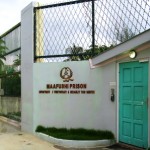Rejecting jailed ex-president Mohamed Nasheed’s appeal for clemency, President Abdulla Yameen has urged him to first exhaust all appeal processes in his terrorism conviction.
“President Yameen responded to Nasheed’s letter with the same answer he’s always maintained – to complete all appeal processes,” said the president’s office spokesperson Ibrahim Muaz Ali.
Nasheed is serving a 13-year-jailterm on a terrorism charge relating to the arrest of a judge during his tenure. The rushed trial was widely criticized for its apparent lack of due process.
President Yameen’s letter was sent to Maafushi Jail.
Nasheed’s lawyers maintain they have been blocked from filing an appeal after the criminal court failed to release a report into case proceedings within the shortened 10-day appeal period.
The Supreme Court has removed discretionary powers granted to high court judges to accept late appeals, in the same ruling that had shortened the 90-day appeal period to 10 days, lawyers have said.
The government, however, insists Nasheed can still appeal.
Meanwhile, two judges who sentenced Nasheed were promoted to the high court last week.
The opposition leader has previously said he does not trust the Maldivian judiciary to accord him justice unless recommendations of judicial reform are fully implemented.
Nasheed’s imprisonment has triggered a political crisis with daily protests for three months, two historic mass marches, and the arrest of hundreds of protesters. Three more opposition leaders have been charged with terrorism.
In the appeal for clemency, Nasheed’s lawyers noted that the Clemency Act grants the president the discretion, on the president’s own initiative, to commute the sentence of any individual convicted of a criminal offence.
Calls for Nasheed’s release are growing. Amnesty International called Nasheed’s conviction a “travesty of justice” while the UN human rights chief said Nasheed was sentenced after a “hasty and apparently unfair trial” and noted “flagrant irregularities.”
The UN special rapporteur on the independence of judges and lawyers noted “serious due process violations” such as denial of the opportunity to present defence witnesses, which led her to believe “the outcome of the trial may have been pre-determined.”
The European parliament in April adopted a resolution condemning the “serious irregularities” of Nasheed’s terrorism trial and called for his immediate release.
The US secretary of state John Kerry said during a visit to Sri Lanka that Nasheed was “imprisoned without due process”.
“This is an injustice that needs to be addressed soon,” he said.
US senators John McCain and Jack Reed have urged their government to press for the release Nasheed and all other political prisoners in the Maldives.






